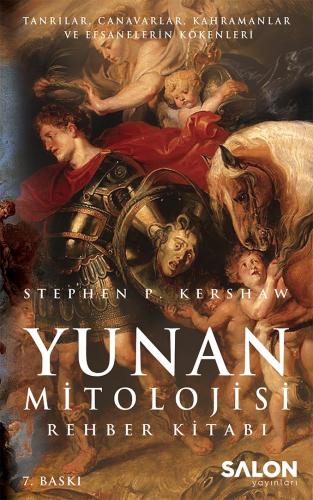
Catalog Registration: Click Here
Yunan mitolojisi rehber kitabı : tanrılar, canavarlar, kahramanlar ve efsanelerin kökenleri
In the twenty-first century we live in, we are constantly surrounded by the resonances of Greek mythology, and we always talk about myths, although we rarely get distracted. We live in a chaotic world (Khaos, originally called) where Trojans threaten our computers and Ajax is both a cleaning product and a Dutch football team. On the one hand, politicians consider the ideas of their opponents as 'fairy tales' (in other words; lies), on the other hand, media archaeologists are trying to bring to light the truth underlying the 'myth' of Atlantis. Centaurs, human-headed horses, C.S. Lewis's Narnia books and J.K. They adorn the pages of Rowling's Harry Potter series; in the world of football, managers say their strikers have the Midas touch; A man can be Adonis, a woman can be a siren or a harpy, and as we all know, we all have Achilles tendons. Others are nymphomaniacs who belong to the semantic roots of Greek mythology and read erotic works, using aphrodisiacs in all their actions. In the meantime, we should definitely steer clear of the Greeks who offer gifts as we undertake Herculean tasks, grapple with the Oedipus complex, and embark on individual 'Odysseus' journeys.
This book allows you to review the essence of Greek mythology, and provides quick access to the right source for the myths that are most effective when told directly. There are many versions of similar basic stories told by different authors at different times and places for different reasons. Many of these differences will be illuminated. This book will also explore the repercussions and veracity of Greek tales from ancient Greece to the twenty-first century. The Greek Mythology Guidebook covers three main areas:
In the first part, myth and mythology were investigated. Is it possible to define what the Greek myths were? Can they be distinguished from other traditional fairy tales? Is there a correct definition?
In part two, we'll take a journey through some of the main tales of Greek mythology. We cannot claim to be a research covering all myths and their different forms. Otherwise this would have been a colossal piece of work.
What we try to achieve in the book is to take the reader through the 'chronological' order of these exciting stories, from the birth of the gods to the return of the Trojan heroes to their homes. Alongside a few lesser-known heroes and themes, similar stories will be encountered, such as Jason and the Argonauts, the Trojan War, and Odysseus. In addition, this book often attempts to explain interesting topics that emerge from the stories and discuss myths along with their truthfulness. Did the Trojan War really happen? What about Atlantis? How have legendary findings been used or abused in more modern times? Are we just another part of the Greek tradition?
In the third part, we will see a brief analysis of the different scientific (or less scientific) explanations of Greek myths from Antiquity to the present. Scientists have pondered to uncover the origins and meanings of millennial myths. Therefore, this book presents research from Euhemerus to some of the main intellectual approaches from Freud and beyond.

